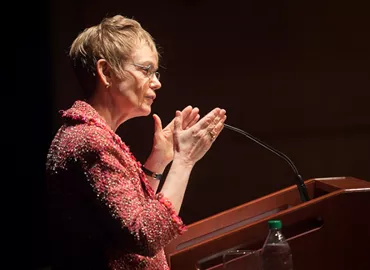President Chopp Joins College Leaders to Explore Challenges Facing Liberal Arts Institutions

Mere days before The Philadelphia Inquirer's April 15 above-the-fold Sunday special report "Highly educated, deeply in debt" probed the market value of a liberal-arts graduate who'd majored in religion, some of the leading lights of higher education gathered to address why nonspecialization, among other hallmarks of a liberal-arts education, is not just worthwhile but vital.
Sponsored by Swarthmore and Lafayette Colleges, "The Future of the Liberal Arts in America and its Leadership Role in Education Around the World" drew more than 230 presidents, provosts, and foundation and association officers from around the United States and the United Kingdom to Easton, Pa., April 9-11.
President Rebecca Chopp and longtime friend and colleague Lafayette President Daniel Weiss conceived the conference for the following reasons: To identify and analyze key environmental factors and internal drivers that affect the mission and sustainability of residential liberal arts colleges; to discover what existing pilots and/or best practices hold promise for future development; and to explore new narratives and models of the liberal arts to guide undergraduate education in the 21st century.
While sessions such as one led by Suzanne Welsh, Swarthmore's vice president for finance and treasurer, explored financial sustainability, other speakers examined affordability and access in higher education, the role of technology in advancing institutional missions, the difference between education and vocational training, and ways in which collaborations and connections can foster sharing of academic and other resources.
William Bowen, the president emeritus of The Andrew W. Mellon Foundation and Princeton University provided the keynote address: "More to Hope than to Fear: The Future of Liberal Arts Colleges."
Kicking off the final day of the conference, President Chopp illuminated the distinctiveness of the liberal-arts model of residential colleges in her address "Distinctively American? Creating a New Narrative for Residential Liberal Arts College."
Her coining of the term "intentional communities" as a model for the way in which residential colleges should evolve in the 21st century drew many comments and questions from audience members, such as a representative of the Johns Hopkins University Press, who asked, "Can we have intentional communities that are not geographically bound?"
Chopp's response, "We have a deep longing to belong." In part, that requires physical - rather than virtual - proximity, she noted.
"Your remarks reaffirm what small colleges can accomplish [with intentional communities]," one spectator commented to Chopp. "We just need to tell the story the right way - a way that advocates for what's powerful about communities." Another president agreed that the value-of-the-liberal-arts narrative should be more "aggressively articulated. We've been passive about making the case."
Chopp suggested that, among other methods, presidents could spread the word by writing op-ed pieces or take to the virtual airwaves by making videos that could be posted to YouTube.
In assessing the three-day event, Chopp said, "The conference exceeded our expectations. Many at the conference expressed their deep appreciation for having the opportunity to come together to think strategically and holistically about the future of the liberal arts during this very exciting and very challenging time confronting higher education.
"Many of the presidents are already talking about future meetings, perhaps both virtual and real, and of course there will be a book developed from the presentations made at Lafayette," Chopp added. "It was exhilarating and illuminating and bodes very well for the liberal arts broadly as well as Swarthmore more specifically. We share a profound commitment to continue offering the kind of education we so deeply value, as well as a commitment to adapt to meet the changing needs of our students, our communities, and the world."



